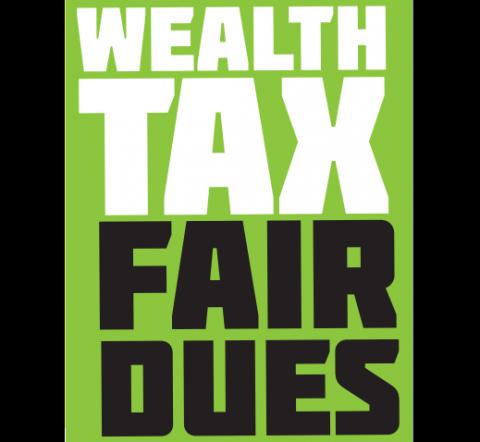Budget 2012: Tax more, cut less

Claiming Our Future have launched a new campaign - Wealth Tax: Fair Dues - urging the Government to increase taxes on the wealthy rather than cutting public expenditure in Budget 2012.
They say:
Cutting public expenditure and increasing taxes on lower income earners is a choice that will hit those least able to cope with the crisis and will hamper our chances of recovery.
There are other choices that will be less socially and economically damaging. We believe that taxing wealth, of which there is still huge amount in Ireland, is the right option. We need the solidarity of people who hold wealth at this time. Across the world there are moves to ensure that those with the most take their fair share of the burden.
We call on TDs and Senators to vote for Budget 2012 ONLY if it includes increasing taxation on wealth.
Solidarity is crucial at this time of deep crisis, especially the solidarity of those who have the most in our society. No one is unaffected by the crisis but the burden on those living on low incomes and those coping with high levels of personal/ household debt is much greater than for others.
Public services are being cut and for many this means not having adequate access to health care and essential social protection. Cuts to education are jeopardizing our children’s futures.
We need solidarity from the wealthy because they can afford to pay without affecting their well-being and without damaging the economy. The low-paid spend most of their income so cutting and taxing this income will further reduce consumption.
Cutting public services greatly reduces the capacity of people to cope with the crisis and to have an acceptable minimal quality of life.
Such solidarity through taxation could include:
- A levy on assets and property worth over €1 million
- High net worth Irish citizens paying their dues here so that the number of tax exiles decreases
- Eliminating tax breaks for those with high incomes so that they pay their fair share
- A levy on financial transactions (Tobin Tax)
- A higher tax rate on incomes over €100k
Taxes on high incomes and wealth have been introduced in countries such as Germany, France, Norway, Canada. More recently, the US has proposed the ‘Buffet tax’.
By failing to take this approach government is reneging on its commitments to fairness, inclusion and social protection.
The Government has choices
The €3.6 billion budget adjustment proposed in the 2012 budget will involve cutting public expenditure and tax increases. The government seems intent on introducing more spending cuts over increasing taxes. This is a choice that will hit those least able to cope with the crisis and will hamper our chances of recovery.
Decisions about taxation are ultimately a political decision. Even with the deficit reduction targets set under the EU/IMF agreement, the Government still has the freedom to introduce tax increases and/or spending cuts, or any combination of the two.
‘Our parties are committed to protecting the vulnerable and to burden sharing on an equitable basis.’ Programme for Government 2011
You can sign the online petition here.
Below, the facts on wealth and tax, taken from Wealth Tax: Fair Dues.
Wealth
Wealth is what you own minus what you owe and includes all income, cash, shares and equity.
Wealth comes in different forms: homes, liquid assets such as savings in the bank, other property, and corporate stocks and shares.
The facts
Ireland is the 7th wealthiest country out of 27 EU countries. Eurostat 2011
The 300 richest people in Ireland are worth close to €50bn. Sunday Independent Rich List 2010
Ireland has the 2nd highest proportion of millionaire households in the EU. Boston Consulting Group Global Wealth Report 2011
The number of ‘high net worth individuals’ in Ireland rose 5% to 19,000 in 2010 (people with $1m or €700,000 of investible assets). Merrill Lynch Global Wealth Report 2011
Tax
The marginal tax rate is the percentage of one’s income that one must pay tax on. Effective tax rate refers to what you actually pay after tax expenditures, credits, etc. are taken into account.
The facts
Ireland has the 4th lowest tax take as a percentage of GDP in the European Union. OECD 2009
The majority of tax breaks benefit high income groups e.g. 80% of the benefit of pension contributions goes to the top 20% of earners. ESRI 2009
Countries with the highest tax rates are also the most competitive and have lowest levels of poverty and inequality. OECD 2008
While house property values have declined substantially, financial wealth has risen by 70% since 2009. Central Bank 2011
Wealth Distribution
More equal countries do better on many levels. They have fewer health and social problems, higher levels of well being and are safer places to live. The Spirit Level, Wilkinson and Pickett, 2009
There is a direct link between higher levels of income inequality and economic collapse. Societies can only tolerate a certain level of unequal wealth distribution. World Economic Forum 2011
The concentration of wealth is antidemocratic as it allows for parallel concentrations of power and influence. Transparency International
Tax increases are less damaging than spending cuts, less deflationary and more successful in reducing the deficit. ESRI 2011
Low paid workers spend almost all of their income because they have to, thus stimulating the economy. TASC 2011
Low paid workers are liable for the universal social charge and pay more than double the proportion of their income on VAT than higher earners. TASC 2011
{jathumbnailoff}
